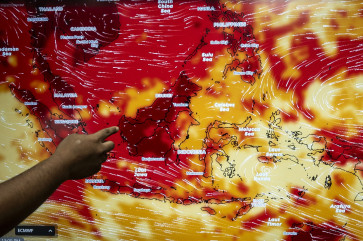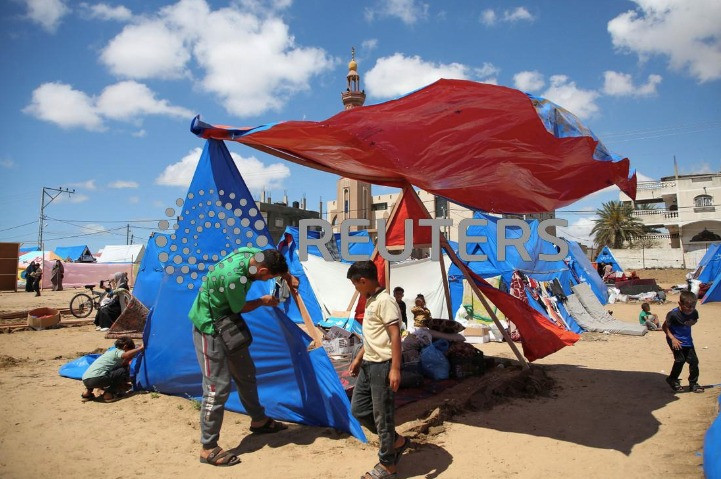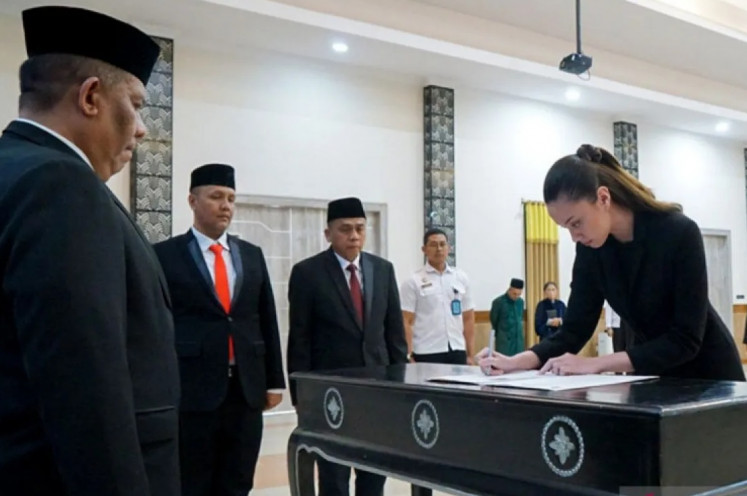Sharia banking: Supporting establishment of KNKS
Change Size
 A BCA Syariah staff member serves a customer after an opening ceremony at its headquarters on Jl. Jatinegara Timur in East Jakarta on April 5, 2010. (JP/P.J. Leo)
A BCA Syariah staff member serves a customer after an opening ceremony at its headquarters on Jl. Jatinegara Timur in East Jakarta on April 5, 2010. (JP/P.J. Leo)
T
his has been a remarkable year for the development of Islamic finance in Indonesia. In early March, Indonesia hosted an Organization of Islamic Cooperation (OIC) summit. After an interval of five months, Indonesia became the host of the 12th World Islamic Economic Forum.
There has also been a great close to the year as President Joko “Jokowi” Widodo finally signed Presidential Decree No. 91/2016 on the establishment of National Committee of Sharia Finance (KNKS) at the beginning of this month.
Discussions to establish the committee had been underway for almost a year, as many had acknowledged the need for a new institution to boost the Islamic finance industry in Indonesia.
Previously at the World Islamic Economic Forum, the National Development Planning Board (Bappenas) launched a Master Plan for Indonesian Islamic Financial Architecture. One of its recommendations was the establishment of a special committee to improve Indonesia’s Islamic finance industry. Thus the newly signed presidential decree signals the government’s commitment to further developing Islamic finance in the country.
The primary objective of the committee, which will be chaired by the President, is to boost the potential of domestic Islamic finance. Strategically, this will be a quantum leap as the President is eager to turn Indonesia into a global hub for Islamic finance.
Based on the Islamic Finance Country Report for Indonesia, the Islamic Research and Training Institute (IRTI) outlined some major opportunities as well as important challenges to unlock the potential growth. Despite having the biggest Muslim population in the world, and being a dynamic emerging economy, Indonesia’s Islamic finance industry lags behind its peers in other major Islamic countries. Locally, it also still falls behind its conventional counterparts.
Even though Islamic financial growth reached 139 percent year-on-year since 2010 compared to conventional growth (only 42
percent), after more than two decades its market share in the country is still stuck below 5 percent.
One of the main obstacles in Indonesia’s financial sector is the low level of financial inclusion. According to the Global Financial Inclusion Index, in 2014 only 36 percent of Indonesia’s adult population held a bank account. This is partly due to the low levels of financial literacy in the country. The low financial literary is especially evident when we see that among the top five reasons why Indonesians do not have a bank account are not feeling the need for one, the perceived cost of transactions and not having knowledge about how to open an account.
Nevertheless, financial inclusion plays an important role in handling poverty and inequality to address the Millennium Development Goals (MDGs). Therefore, building the financial industry, especially the Islamic finance industry, will play a great role in benefiting society.
Financing capacity is also another problem at Islamic banks. Some of the existing Islamic banks in Indonesia are undercapitalized, so they are unable to expand their businesses rapidly. With the current growth rate, it is likely that Islamic banks will not expand much unless more radical steps are taken. A capital injection may be one alternative solution. Another strategy that has been discussed is a merger of three major Islamic banks in Indonesia.
Despite its current condition, the Islamic finance industry has great potential to contribute to the national economy and also society. Jokowi’s administration is focused on boosting infrastructure. Funds in the infrastructure sector until 2019 could reach US$419 billion. There are plenty of opportunities for the Islamic finance industry to contribute to infrastructure financing. Islamic infrastructure finance is seen as well-suited to infrastructure financing as the asset-backed nature of Islamic finance makes it an ideal contender to build infrastructure.
Furthermore, the tax amnesty program promoted by the Finance Ministry has also become another potential area for Islamic finance growth. The repatriation of funds resulting from the tax amnesty will have an impact on two things, namely the investment and business sectors. Islamic financial products may be a gateway for the repatriation of huge amounts of money. Corporate sukuk (Islamic bonds), for instance, are expected to be able to accommodate these repatriated funds.
The vision of becoming a center for the world’s Islamic finance cannot be achieved through isolated efforts. Collaboration between the government, corporations and civil society is necessary. Many of us have great expectations for this committee, particularly on the impact of effective coordination between related stakeholders in the Islamic finance industry.
We hope that the government, regulator, bankers, academics and Islamic fatwa authorities are on the same page about advancing the industry to bring more benefits to our economy. Therefore, the committee will be tasked with synchronizing various regulations on Islamic finance, facilitating the development of Islamic finance in Indonesia and overseeing the implementation of the master plan.
Concrete actions from the committee could facilitate a conducive environment for the industry. There are several ways to achieve these goals. It could be formulating regulations and incentives to boost Islamic financing.
The committee could also expand on education and campaigns related to Islamic financial products as well as vigorous promotion activities. Furthermore, it could be coupled with developing rules and industry certification for religious experts that endorse innovations in Islamic financial products. This is especially important as there is a need to further develop existing products to become more sophisticated.
The establishment of the KNKS shows a strong commitment from the government to support Islamic finance advancement. It is expected that the establishment of the committee could be an effective top-down approach to drive growth in Islamic financial sectors.
According to the decree, the committee will have executive management by the middle of next year. Led by professionals, it is expected that they will strengthen Islamic financial institutions by formulating incentives and a regulatory system for the industry as well as promoting the benefits of Islamic financial products to public.
Then, of course, our next task will be supporting the committee and keeping an eye on them to make sure they work effectively.
_____________________________________
The writer is a postgraduate student in Islamic finance at Durham University’s Business School, UK.









